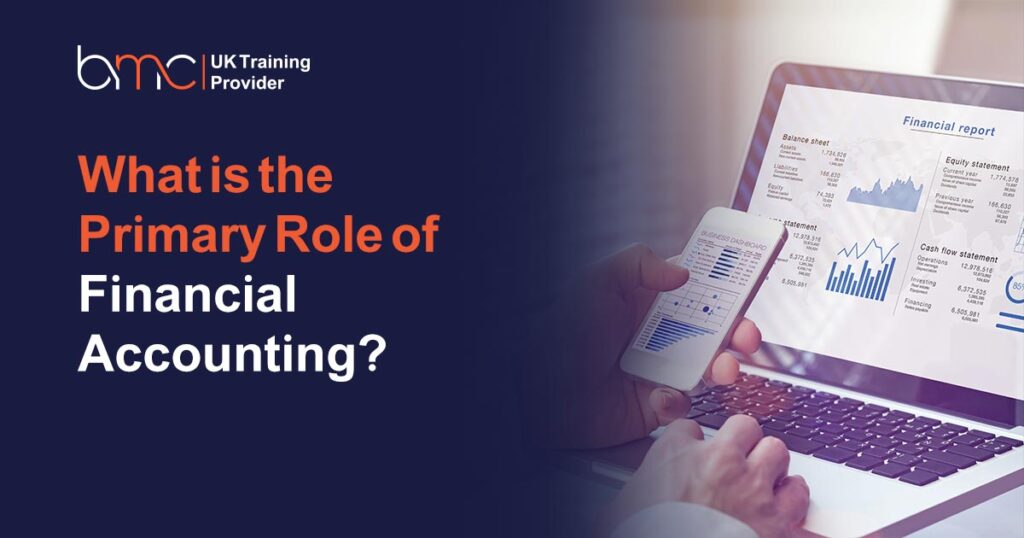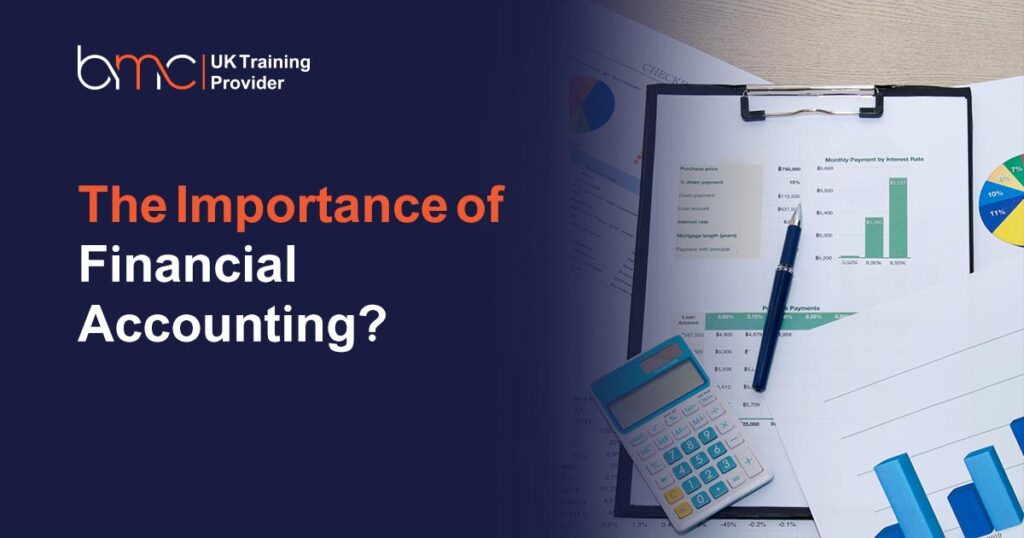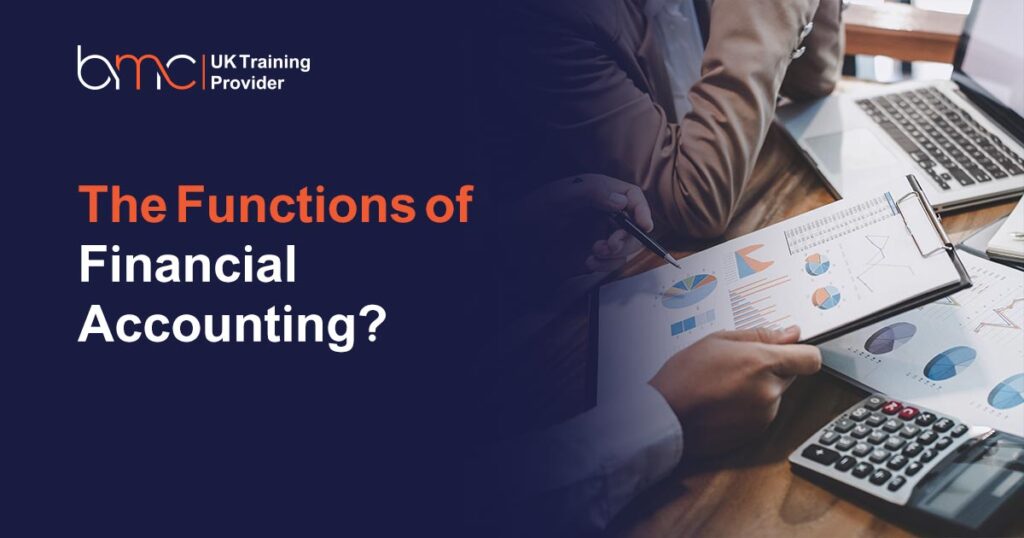
What is the Primary Role of Financial Accounting?
- At its core, the primary role of financial accounting is to provide stakeholders with accurate and reliable financial information that enables them to make informed decisions.
- By systematically recording, summarising, and reporting financial transactions, financial accounting facilitates transparency, accountability, and trust within organisations. It serves as the foundation for evaluating performance and financial health, and planning for the future.
- Moreover, financial accounting plays a crucial role in ensuring regulatory compliance, protecting assets, and reducing risks. Ultimately, the primary role of financial accounting is to empower stakeholders with the insights and information they need to drive organisational success and achieve their strategic objectives.

The Importance of Financial Accounting
- The significance of financial accounting cannot be overstated, as it serves as the primary source of financial information for stakeholders across various domains.
- Managers rely on financial reports to assess performance and make strategic decisions, while investors use them to evaluate the organisation’s financial health and potential for growth.
- Similarly, creditors depend on financial accounting to measure creditworthiness and evaluate the risk associated with lending. Furthermore, government agencies rely on accurate financial data to ensure regulatory compliance and fee taxes appropriately.
- In essence, financial accounting acts as a compass, guiding stakeholders through the intricate maze of financial intricacies and facilitating informed decision-making.
Financial accounting performs several critical functions that sustain its importance in organisational operations.
Firstly, it plays a pivotal role in identifying, processing, and documenting financial transactions, encompassing activities such as sales, purchases, payments, and service deliveries. This accurate recording of transactions forms the foundation for further financial analysis and decision-making.
Secondly, financial accounting quantifies the financial value associated with each transaction, elucidating the cash equivalent of each operation and providing insights into the economic implications of business activities.
Thirdly, precision and historical accuracy are main factors in financial accounting, ensuring the integrity and reliability of financial data through accurate record-keeping. All identified and measured transactions are meticulously documented in accounting records.
Finally, financial accounting synthesises previously recorded data into comprehensive financial statements, accompanied by insightful analyses that empower decision-makers to navigate the complexities of the financial landscape confidently.
This delivery of results through financial statements is perhaps the most critical function of financial accounting, enabling decision-makers to make well-informed choices for the organisation’s future.
Characteristics of Financial Accounting:
Effective financial accounting is characterised by several key attributes that maximise its utility and relevance for stakeholders.
Firstly, timeliness is essential, as stakeholders require up-to-date financial information to make informed decisions promptly. Clear and concise reporting ensures that financial data is presented in an understandable manner, facilitating comprehension and analysis.
Objectivity is another crucial aspect, as financial accountants must document information and figures impartially, devoid of personal bias or manipulation.
Moreover, comparability enables stakeholders to compare financial data across different time periods or entities, providing valuable insights into financial trends and performance metrics.
These characteristics collectively enhance the credibility and reliability of financial accounting information, promoting trust and confidence among stakeholders.
functions of financial accounting
Financial accounting plays a crucial role in any business by systematically recording, summarizing, and reporting financial transactions. It ensures transparency, helps businesses comply with regulations, and provides critical financial insights. Below are the key functions of financial accounting:
1. Recording Financial Transactions
The primary function of financial accounting is to systematically record all business transactions in a structured and organized manner. This process follows the double-entry accounting system, where each transaction is recorded as a debit in one account and a credit in another. This ensures accuracy and helps businesses keep track of their financial activities.
Example:
If a company purchases office equipment for $5,000, the accounting system will record a debit in the “Equipment” account and a credit in the “Cash” account.
2. Classifying and Organizing Financial Data
After recording transactions, financial accounting classifies them into different categories such as assets, liabilities, equity, revenue, and expenses. This classification allows businesses to generate financial statements and analyze their financial health more efficiently.
Example:
- Sales revenue is classified under income.
- Loans and debts are classified under liabilities.
- Business-owned assets (such as buildings and vehicles) fall under assets.
3. Summarizing Financial Information
Financial accounting summarizes recorded data into structured reports, making it easier for stakeholders to understand the company’s financial position. These summaries are usually presented in the form of financial statements, such as:
- Income Statement (Profit and Loss Statement) – Shows revenues, expenses, and net profit or loss.
- Balance Sheet – Provides a snapshot of assets, liabilities, and equity.
- Cash Flow Statement – Tracks cash inflows and outflows to show liquidity.
Example:
At the end of a financial year, a company generates an income statement that summarizes its total sales, costs, and net profit.
4. Financial Reporting and Compliance
One of the most important functions of financial accounting is preparing reports that comply with legal and regulatory requirements. Businesses must follow Generally Accepted Accounting Principles (GAAP) or International Financial Reporting Standards (IFRS) to ensure transparency and accuracy. These reports are essential for tax authorities, government agencies, and investors.
Example:
A publicly traded company must publish financial statements that adhere to IFRS or GAAP standards to maintain investor confidence.
5. Assisting in Decision-Making
Financial accounting provides business owners, investors, and managers with critical financial insights, allowing them to make informed decisions. By analyzing financial statements, businesses can determine profitability, reduce costs, and improve financial performance.
Example:
A company analyzing its income statement may decide to cut unnecessary expenses to improve profit margins.
6. Facilitating Financial Planning and Budgeting
Accurate financial records help businesses create realistic budgets and forecasts. By analyzing past financial performance, companies can set goals and allocate resources effectively for future growth.
Example:
If a company’s cash flow statement shows low liquidity, it may adjust its budget to reduce unnecessary expenses and increase cash reserves.
7. Detecting Fraud and Errors
Financial accounting helps in identifying fraud, mismanagement, or accounting errors by ensuring proper documentation and regular audits. Internal and external audits verify the accuracy of financial records, preventing potential financial risks.
Example:
A company conducting an internal audit might detect unauthorized transactions or discrepancies in its financial statements.
8. Ensuring Business Transparency and Investor Confidence
Investors and stakeholders rely on financial accounting to assess a company’s financial health. Transparent financial statements help businesses gain credibility, attract investors, and secure funding.
Example:
A startup seeking investment will present audited financial statements to potential investors to showcase profitability and growth potential.
Financial accounting types
Financial accounting encompasses various types that focus on different aspects of a company’s financial reporting and compliance. Here are the main types:
- Financial Reporting:
- This type involves the preparation of financial statements, including the balance sheet, income statement, statement of cash flows, and statement of shareholders’ equity. These reports provide an overview of a company’s financial position, performance, and cash flow, primarily intended for external stakeholders like investors, creditors, and regulatory agencies.
- Managerial Accounting:
- Though more closely related to management accounting, managerial accounting can also be considered a type of financial accounting when it involves the preparation of financial reports used internally by management for decision-making purposes. This includes budgeting, forecasting, and various forms of financial analysis.
- Tax Accounting:
- Tax accounting deals with the preparation and submission of tax returns and payments, ensuring compliance with tax laws and regulations. It focuses on calculating taxable income and the appropriate amount of tax owed, following the rules set by tax authorities.
- Auditing:
- Auditing involves the independent examination of financial statements and related records. This can be either internal or external. External audits are conducted by independent audit firms to provide assurance to stakeholders that the financial statements are free from material misstatement. Internal audits are conducted by a company’s own internal audit department to assess the effectiveness of internal controls and compliance with policies and procedures.
- Cost Accounting:
- Cost accounting focuses on capturing and analyzing the costs of production or services. It helps companies understand their cost structures, control expenses, and make informed pricing and budgeting decisions. Cost accounting includes methods like job costing, process costing, and activity-based costing.
- Forensic Accounting:
- Forensic accounting involves investigating financial discrepancies and fraud. It includes examining financial records to detect and prevent fraudulent activities, providing evidence in legal cases, and sometimes participating in criminal investigations.
- Government Accounting:
- Government accounting involves the management and reporting of financial transactions for government entities. It follows specific standards and principles that differ from those used in private sector accounting, focusing on accountability and transparency in the use of public funds.
- Non-Profit Accounting:
- Non-profit accounting involves the financial management of non-profit organizations, focusing on accountability rather than profitability. It includes tracking donations, grants, and other sources of funding, and ensuring that resources are used according to donor restrictions and organizational goals.
Each type of financial accounting serves specific purposes and audiences, providing critical financial information that supports decision-making, compliance, and transparency.
Impact of Financial Accounting in Decision Making
The role of financial accounting in decision-making processes within organisations is profound and far-reaching. Managers rely heavily on financial reports to evaluate performance, identify areas for improvement, and allocate resources effectively.
Investors rely on financial accounting information as a critical tool to measure an organisation’s financial health and potential for growth, guiding investment decisions and portfolio management strategies.
Similarly, creditors influence financial accounting data to evaluate creditworthiness and lending risk, shaping the terms and conditions of lending arrangements.
Additionally, government agencies depend on financial accounting information to ensure regulatory compliance, assess tax liabilities, and enforce financial regulations.
In essence, the role of financial accounting relies on empowering stakeholders to make well-informed decisions that drive organisational success and promote sustainable growth.
Technical Advancements in Financial Accounting
Technological advancements have revolutionised financial accounting practices, ushering in an era of novel efficiency, accuracy, and accessibility.
Accounting software solutions automate routine tasks such as data entry, reconciliation, and financial reporting, facilitating processes and minimising human error.
Data analytics tools enable financial accountants to derive actionable insights from vast amounts of financial data, facilitating informed decision-making and strategic planning.
Moreover, cloud computing technologies enhance collaboration and accessibility, allowing stakeholders to access financial information anytime, anywhere.
The advent of blockchain technology holds the promise of enhanced transparency, security, and integrity in financial transactions, revolutionising the way financial data is recorded, verified, and reported.
These technological advancements highlights the dynamic nature of financial accounting and its continual evolution to meet the evolving needs of modern businesses.
Read Also : Key Principles of Accounting Constraints
Challenges and Future Trends in Financial Accounting
Despite the countless benefits of technological advancements, financial accounting faces several challenges and opportunities on the horizon.
Regulatory compliance remains a perennial challenge, as organisations must navigate a complex landscape of accounting standards, regulations, and reporting requirements.
Data security and privacy concerns pose significant risks, particularly in an era of increasing cyber threats and data breaches.
Moreover, globalisation and digitalisation have introduced new complexities and uncertainties, requiring organisations to adapt and innovate in response.
However, these challenges also present opportunities for innovation and growth, with emerging trends such as sustainability reporting, integrated reporting, and predictive analytics shaping the future of financial accounting.
Organisations will have a competitive advantage in the global marketplace if they adopt these trends and use technology wisely, which will promote long-term success and expansion.

Professional Development Opportunities in the Financial Accounting
For professionals seeking to advance their proficiency in financial accounting, a large number of professional development opportunities awaits.
Finance and accounting training courses offer comprehensive curricula covering essential topics such as financial statement analysis, budgeting and forecasting, and internal controls.
Following professional certifications such as Certified Public Accountant (CPA), Chartered Financial Analyst (CFA), and Certified Management Accountant (CMA) not only validates expertise but also enhances career prospects within the field of financial accounting.
Additionally, continuing education programs provide ongoing learning opportunities to stay in a row with trends, regulations, and best practices in financial accounting.
By prioritising professional development, individuals can augment their knowledge base, refine their skill set, and propel their careers forward, which is one of the top beneficial roles of financial accounting.
Conclusion
The role of financial accounting in modern business is remarkable, serving as the cornerstone of organisational financial management and decision-making.
From transaction identification to financial reporting, financial accounting functions and characteristics are essential for stakeholders to navigate the complexities of the financial landscape effectively.
Technological advancements, emerging trends, and professional development opportunities highlights the dynamic nature of financial accounting, shaping its evolution and impact on organisational success.
By addressing challenges, and investing in professional development, organisations and professionals can harness the power of financial accounting to drive sustainable growth, promote transparency, and achieve their strategic objectives.
To delve deeper into the world of accounting, consider exploring finance and accounting training courses and Accounting, Decision Making, and Financial Communication programs.
Enrolling in one of these comprehensive programs will enhance your understanding of financial accounting, making it a valuable asset in your professional journey.
Take a look at the HR training courses in Dubai one of the best courses on BMC.
Find more with BMC training:
- Find your course here ALL Courses.
- Check the Training Courses in Barcelona.
- Learn more about the Training in Istanbul.
- You can check the Purchasing Training Courses in Malaysia too.
- So easy to Contact us Now.
FAQ
What are the roles of financial accounting?
Financial Accountant Roles: Financial accountants are responsible for recording, summarizing, and reporting financial transactions. They ensure the accuracy of financial statements and compliance with accounting standards.
What is my role as a Financial Accountant?
You’ll analyze financial data, prepare reports, manage budgets, and assist with financial planning and decision-making.
What is the role and responsibilities of a Financial Accountant?
Your duties may include accounts payable/receivable management, tax preparation, internal audit support, and financial statement preparation.
What is the role of financial accounting primarily to?
It focuses on recording financial transactions to measure an organization’s financial performance and position
What is the main purpose of a Financial Accountant?
Your primary function is to provide accurate and reliable financial information for internal and external stakeholders.
What is the basic function of financial accounting?
It serves as the foundation for understanding an organization’s financial health and making informed financial decisions.


